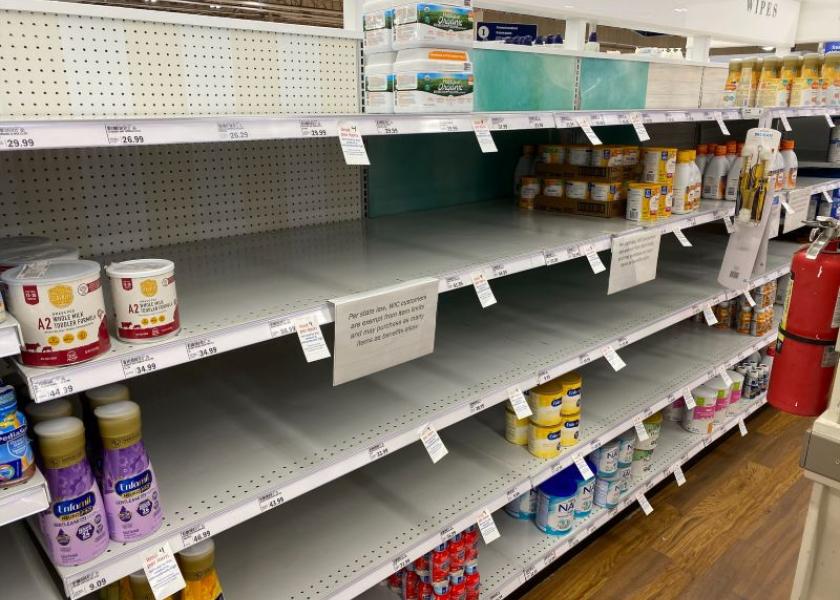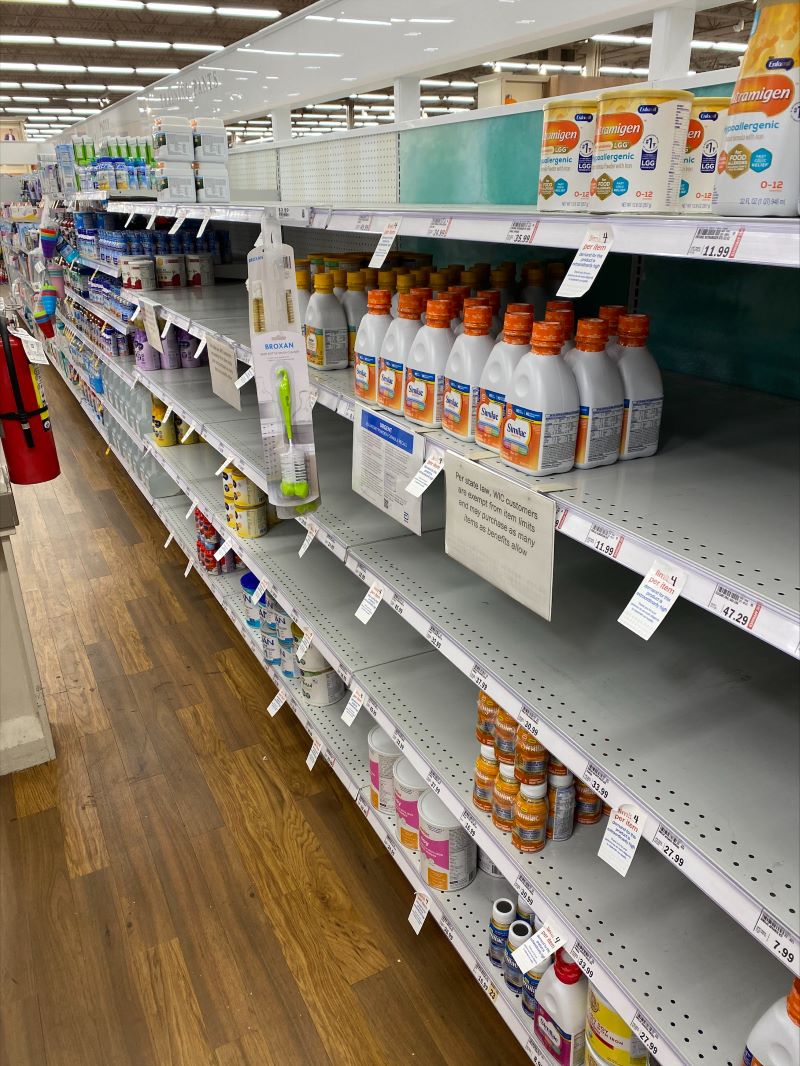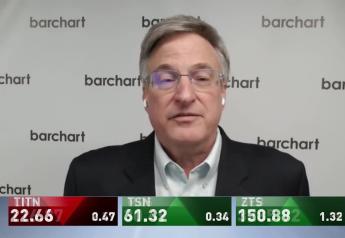Why is There Still an Infant Formula Shortage? The Dairy Foods Industry Says It's Complicated, Just Ask FDA

Parents looking for baby formula continue to find limited options or bare shelves months after the Food and Drug Administration (FDA) began facilitating emergency supplies from foreign manufacturers.
The latest numbers from Information Resources Inc. (IRI), a Chicago-based market research firm, show in the week ending July 31, 27.3% of powdered baby formula was out of stock at U.S. retailers – its lowest rate since June 12.
When looking at all types of baby formula, 18% was out of stock. That is also an improvement over the previous week and it's the industry's best performance since mid-May. Before the nationwide recall and manufacturing shutdown at Abbott earlier this year, out-of-stock rates were 10% according to IRI.
“This market is huge for the dairy industry, especially for whole milk powder,” says Mike North with ever.ag. “Globally the infant formula market is massive, and it has major ripple effects on our business.”
FDA leadership says formula production needs to remain at a high level for six to eight more weeks, as it works to steady supplies and supplements from foreign providers.
So far, 13 applications have received enforcement discretion for regular infant milk formula (IMF) and five applications have received enforcement discretion for infants with special dietary needs. The newest was announced on August 5, for Nestle Health Science. FDA says all told, it adds up to an estimated 18.4 million cans of additional formula.
“We will continue our around-the-clock efforts to make sure that parents and caregivers have access to safe and nutritious infant formula where and when they need it,” says FDA Commissioner Robert M. Califf, M.D. in a recent press release.
A month later, with shelves still spotty and out-of-stock rates elevated, some in the dairy industry say FDA still has work to do.
“FDA has made a meaningful difference in the infant formula supply situation in the U.S., but we still have challenges,” says Michael Dykes, president and CEO of the International Dairy Foods Association (IDFA).
Compliance Confusion
 IDFA has at least a dozen members that manufacture infant formula around the world along with a host of other companies that make the ingredients. Dykes said they met with FDA’s Califf on July 29.
IDFA has at least a dozen members that manufacture infant formula around the world along with a host of other companies that make the ingredients. Dykes said they met with FDA’s Califf on July 29.
“What we've encouraged FDA to do is to bring more transparency to this process,” Dykes says.
According to the FDA’s website, the agency is reviewing requests by companies to import, sell and distribute formulas to the U.S. market. It’s part of a process whereby infant formula manufacturers can provide the FDA with information if they’re interested in selling products to the U.S. market that may not comply with all usual FDA requirements.
A spokesperson for FDA told us:
“While the FDA cannot disclose information regarding pending requests, the agency continues to work around the clock to address current supply challenges, including reviewing, as quickly as possible, a number of requests from companies seeking the FDA’s temporary exercise of enforcement discretion with respect to certain statutory and regulatory requirements in order to increase the supply of infant formula in the U.S. This includes a review of information pertaining to nutritional adequacy and safety, including microbiological testing, labeling and additional information about facility production and inspection history.”
“It goes well beyond receiving a letter of enforcement discretion from FDA,” Dykes says. “There has to be distribution, a production schedule, plus getting the ingredients on hand to make it along with all of the transportation and logistics.”
It’s Complicated
Dykes calls the entire situation complicated. U.K.-based Global Kosher was supposed to be more than a quarter of FDA’s 18.4 million can total. Just last week the agency suspended Global Kosher’s enforcement discretion saying it had submitted altered paperwork.
IMF manufacturers say these volumes aren’t enough to keep up with demand. They estimate the U.S. IMF retail market at 143,000 tonnes per year. Despite the crisis going on for more than five months, only 12,000 tonnes of product, or just one month’s supply has so far been approved.
No additional, large enforcement discretion announcements have been made since July 8, despite companies submitting applications in May.
“We told FDA that once our members apply for a letter of enforcement discretion, if you're not interested or not going to work with them, let them know,” Dykes says. “They're spending money to get prepared to deliver the quantity of infant formula you've asked for and they've promised to deliver.”
New Zealand-based The a2 Milk Company submitted its application on May 27 and followed up on questions from FDA in June. Despite being one of the largest IMF producers in the world, it's yet to hear back.
“The a2 Milk Company stands ready to aid U.S. families and their babies during this critical shortage of products with high-quality infant formula both in the short and long term,” says Blake Waltrip, U.S. CEO for The a2 Milk Company. “We have 1 million tins (approximately 27 million 8-oz. servings) committed through the end of the November discretionary period and one of the largest capacities to provide long-term benefit.”
He says pre-COVID the company was producing more than 50 million tins globally (approximately 1.35 billion 8-oz. servings) and it still has the milk pools and manufacturing capacity to do it again. They also already have a retail footprint in the U.S. market.
“From our conversations with FDA, they intend to issue more letters of enforcement discretion,” Dykes says.
No Go for New Zealand
New Zealand is the world’s largest dairy exporter. Currently, there is only one New Zealand manufactured product with enforcement discretion from FDA. The product represents just 4% of the total stated volume.
While large global suppliers like The a2 Milk Company and FrieslandCampina sit waiting in queue, FDA has given enforcement discretion to smaller manufacturers such as Care A2+ from Australia – a different and unaffiliated company than The a2 Milk Company. Now that Global Kosher 4.8 million cans have been suspended, Care A2+ has the remaining single largest quantity promised, also at 4.875 million cans. It’s an opportunity potentially worth millions of dollars in U.S. sales. However, according to IRI, the 2021 startup sold slightly more than $164,000 worth of product (retail value sales) in the 12 months ending June 2022 to Australian grocery and pharmacies. The prior year to it was $31,450 in retail sales values. It’s a fraction of the volume promised to the U.S. market.
“If you aren't selling in the U.S. you have to create a whole distribution system once it arrives on the shores,” says Dykes, referencing the challenge of the situation for foreign manufacturers.
Even as the Abbott plant in Michigan restarts production for a second time following a factory flood in May, in-store supplies are yet to catch up. FDA says it intends to exercise this enforcement discretion until November 14 in order to help increase supplies. If the product makes it to the U.S. before then it can stay on the self. The dairy industry says that may not be enough time for supply lines to catch up.
“There's uncertainty about what happens after November 14,” says Dykes.







